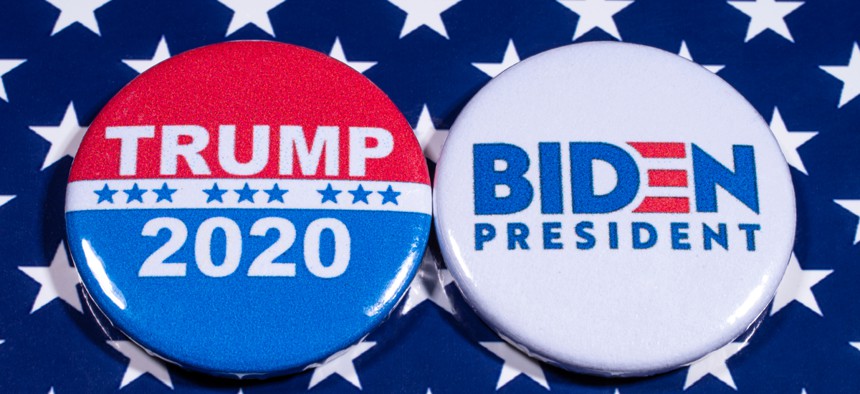Here Are the Major Differences Between Trump and Biden on Tech Issues

chrisdorney/Shutterstock.com
President Trump favors reducing government hurdles to usher in technology while rival Joe Biden favors an active government role in partnering with industry, according to a report.
President Trump and Democratic presidential nominee Joe Biden could not be more different on several tech and innovation issues, according to a report released Monday by the nonpartisan Information Technology & Innovation Foundation.
The 40-page report compares both presidential candidates on 10 specific issue areas: innovation and research and development; internet and digital economy; broadband and telecommunications; education and skills; taxes; regulation; trade; advanced manufacturing; life science and biotechnology and clean energy innovation. The reports’ authors, led by ITIF President Robert Atkinson, found major differences on many of those core issues, chief among them the federal government’s role facilitating technology and innovation policy.
President Trump’s approach since his 2016 election has focused on “reducing government barriers” to technology and innovation, reducing taxes and eliminating regulations the administration believes limit innovation. Under Trump, the amount of federal spending on tech has generally increased during his four-year term, but ITIF notes that—with the exception of certain technologies—the administration has reduced spending on tech research and development.
Biden, however, indicates through his economic plan he supports “significantly increased public investment in R&D and advanced production.” Biden also favors a larger government role in health care and physical infrastructure investment, which could play into policies if elected.
Trump and Biden also differ significantly on climate innovation, immigration, rural broadband infrastructure and tax and regulation. While Trump’s budget proposals have reduced funding for clean energy investment, Biden has made climate change a core issue of his campaign, and supports “massive increases in clean energy” R&D funding, the report states. On immigration, Trump has pushed back against low-skill, H1-B and illegal immigrants, while Biden supports both high- and low-skill immigrants. Both candidates support increased federal investment in rural broadband infrastructure, but Biden supports “much larger federal investments in this space,” the report states.
Among the most stark differences between the two candidates are on the issues of tax and regulation.
“The Biden campaign supports higher taxes on business, particularly large corporations; stronger regulations, including on privacy and broadband providers; and more-aggressive antitrust enforcement, particularly on large Internet companies,” the report states. “The Trump administration embraces a more traditional Republican approach of lighter regulations and lower business taxes, and antitrust that is grounded in the consumer welfare principle.”
The report’s findings are based on information gathered from the candidates’ websites, policy documents and public statements the candidates have made. The authors also note that while Biden has stated public positions on most tech issues, “Trump has been much vaguer, offering a few detailed positions.”
In at least one issue—trade policy—Trump and Biden share similar views. “Both are focused on being tough on China,” the report states, and both “reject or at least question the prevailing Washington consensus on expanding trade.” Even on that issue, however, the candidates have differences: Trump prefers a largely unilateral approach against China, while Biden favors a multilateral approach.






